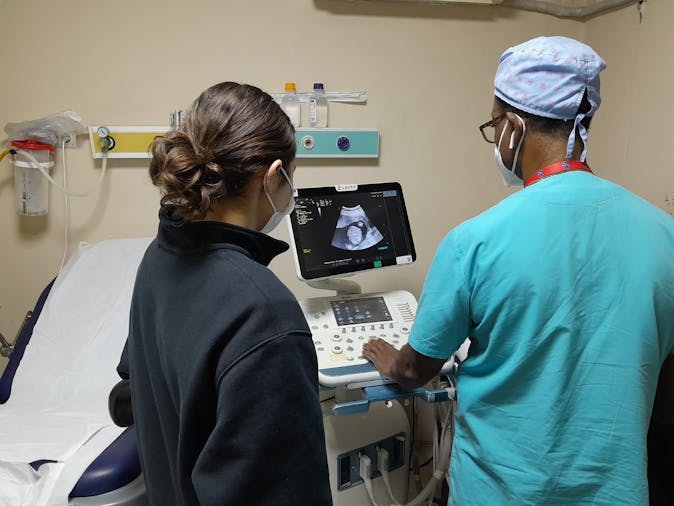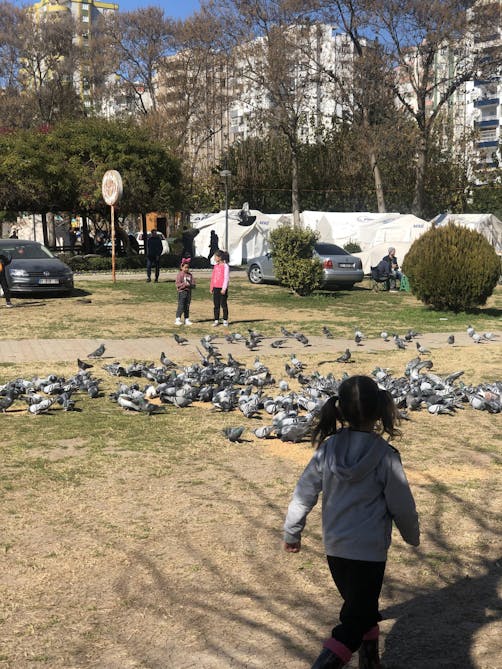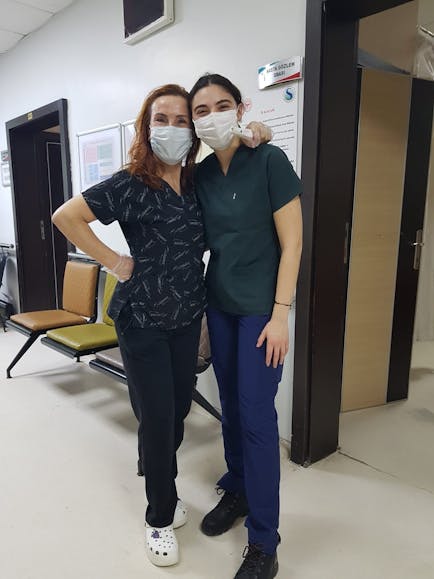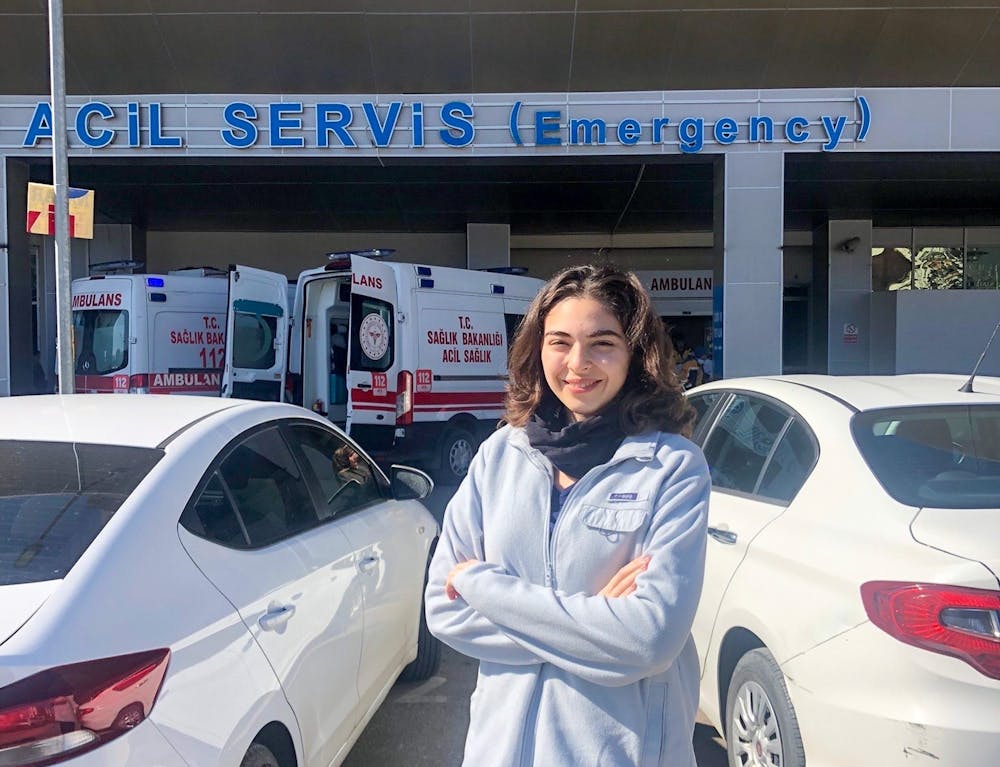Junior Yağmur Bingül woke up to a call from her mother about the catastrophic earthquake that shook Turkey and Syria on Feb. 6. Four days later, she took a 17-hour flight to Adana, Turkey with a mission to provide medical assistance to those harmed.
“I felt the uselessness of being here [on campus],” she said. “I just felt like people needed help. My family’s not okay. I was literally panicking all over.”
The biochemistry and molecular biology major worked as a medical assistant at an emergency room and for a clinical psychiatrist. There, Bingül arranged the vitals for the patients, talked to them, did ultrasounds for pregnant people and ran tests on children to see if panic attacks were scaling down, she said. The Office of Scholars and Fellowships gave Bingül financial support to travel and do volunteer work at Seyhan City Hospital.

Bingül observes an ultrasound in Seyhan City Hospital in Adana, Turkey. Photo courtesy of Bingül.
Bingül said she relied on information from her family members and news updates to understand what unfolded in southern Turkey. Each time Bingül checked the news, the death toll increased. Fifty thousand civilians and counting have died since Feb. 6, according to the Associated Press.
Her close family was safe, but Bingül lost nine distant family members. Bingül said her other ten relatives had to relocate to a safer part of the city and are all sharing an apartment together.
Turkish rescue teams in Adana were saving survivors buried under piles of concrete several weeks after the earthquake. The hospital Bingül worked at kept receiving several of these civilians, but at one point, the hospital reached full capacity and could not treat everyone. There were not enough doctors and healthcare workers for the number of patients, she said.
The first time Bingül arrived at the emergency trauma department, she worked with patients who had lost their arms and legs.
A few days later, Bingül said she was celebrating a child’s birthday at the hospital when a balloon suddenly popped — children cried and ran through the hospital with fear in their eyes.
“I just stopped,” Bingül said. “I was like, ‘oh, this is real,’ you know?”
Enjoy what you're reading?
Signup for our newsletter
That’s when Bingül noticed a 5-year-old boy under the hospital bed. She sat next to him, patiently waiting for the boy to come out. He didn’t. Instead, he looked at Bingül and asked: “Is it over? Are we alive still?”
Bingül could not answer the boy’s question. A pregnant woman asked Bingül the same thing days later, she said.
Bingül said she witnessed abortions because during and after the earthquake, pregnant people became severely injured both physically and mentally and were unable to continue their pregnancies.
“This was just like the biggest thing that just clicked on my brain,” Bingül said. “That I was just way too privileged.”
Working on the University of Richmond Emergency Medical Service team and as a clinical assistant at the Student Health Center helped Bingül recognize she had the skills to serve as a medical assistant at hospitals in Turkey, she said.
“Those are my people and my roots, and it was just such a great feeling to realize that I can actually do this,” Bingül said. “I can use the skills that I gained from here to apply and help my people back [home].”
After working with a clinical psychiatrist, Bingül learned that adults can take up to 30 days to talk about a life changing incident, whereas kids react frantically with strong emotion, like how they did when the balloon popped, Bingül said.
“People's minds are just changing so fast, and you're trying to adapt to that trauma in different ways," she said. “It can be in a healthy way. It can be an unhealthy way, and you never know how it's going to change you.”
When Bingül and the volunteers wore their volunteer shirts, patients would not talk to them about what had happened, she said.
Once Bingül took off her volunteer shirt and wore regular attire, patients started talking about what had happened on Feb 6. Some patients could not talk, but just screamed, she said.
While observing the city of Adana, Bingül noticed tents lined up across the streets where volunteers were teaching children, she said.
“Maybe because kids should not feel they lost a house," Bingül said. “So, it was just this whole process of making them feel like they’re still at their home.”

Tents were arranged after the earthquake so volunteers could remain educating children in Adana, Turkey. Photo courtesy of Bingül.
Among the collapsed infrastructure, the inside of one house remained polished and decorative, Bingül said.
“But it didn’t matter,” Bingül said. “That could be my house, and even if I owned everything in that house, you know, I might be dead. So that won't mean anything.”
Turkish residents and survivors have criticized the Turkish government for decades-long practices of poor building regulations, corruption in construction contracts and waiving safety certificates when building infrastructure, according to Al Jazeera Media Network.
Accounting professor Abdullah Kumas, who is originally from Turkey, said people were upset because several construction companies should not have had permits to build in places where the earthquake struck, as the soil was never suitable for the apartments.
“When people lose a loved one, they have a right to complain and criticize,” Kumas said.
Like Bingül, several UR students with ties to the region worried for their families and home country. Turkish junior Pamira Yanar, who is studying abroad in Barbados, worked collaboratively with Turkish students in Richmond to design flyers and ask the UR community to donate. The students raised $3,412 and donated it to two Turkish nongovernmental organizations, AKUT and Ahbap, said sophomore Pinar Yalçin and Yanar.
With school still in session, Bingül had to come back to campus on Feb. 24. Leaving the children was one of the hardest goodbyes, Bingül said.
“It was a moment of just crying,” she said, taking a pause. “We just hugged and stayed there for a while, and I said I had to leave but new volunteers will be coming next week.”
On the flight back to Richmond, Bingül realized she had been so fixated on helping the civilians that she never thought about how much the earthquake had affected her. Even after she left Adana, Bingül kept thinking about all the faces she saw.

Bingül and an emergency OBgyn nurse at Seyhan City Hospital in Adana, Turkey. Photo courtesy of Bingül.
“There’s just this feeling of touching people’s hearts … not even medically, but just being there and talking to people,” Bingül said.
Bingül hopes to return to Turkey soon. For now, Bingül said she feels a mixture of gratitude and sadness. She prayed for everyone who has been affected and has a different outlook on everything she owns.
“Material wise, you don't own anything,” she said, “just your life.”
Contact executive editor Ananya Chetia at ananya.chetia@richmond.edu.
Support independent student media
You can make a tax-deductible donation by clicking the button below, which takes you to our secure PayPal account. The page is set up to receive contributions in whatever amount you designate. We look forward to using the money we raise to further our mission of providing honest and accurate information to students, faculty, staff, alumni and others in the general public.
Donate Now



